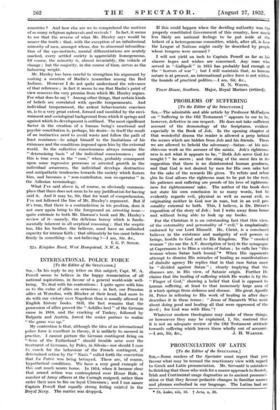PROBLEMS OF SUFFERING [To the Editor of the SPECTATOR.] SIR, —The
admirable and able article by Professor McFadyen on " Suffering in the Old Testament " appears to me to be, however, defective in one respect. He does not take sufficient account of the demonology of the Scriptures, evident especially in the Book of Job. In the opening chapter of that wonderful drama the reader is allowed a peep behind the scenes which are hidden from Job and his friends. There we are allowed to behold the adversary—Satan—at his mis- chievous work as the accuser of the saints. Job's righteous-
ness is not what it appears to be, " Doth Job serve God for nought ? " he sneers ; and. the sting of the sneer lies in its suggestion that there is no disinterested human goodness, and that God is not desired by men for His own sake but for the sake of the rewards He gives. To refute and rebut this lie God allows the righteous man to be put to the test; his patience and suffering are proofs of his love of righteous- ness for righteousness' sake. The author of the book does not state his own conclusion in so many words, but he evidently regards evil, physical as well as moral evil, as originating neither in God nor in man, but in an evil per- sonality external to both. This, I believe, is Dr. Driver's exposition of the story of Job ; but I write away from home and without being able .to look up my books.
For the Christian it is an outstanding fact that this view, of the externality and personality. of " evil," is emphatically endorsed by our Lord Himself. He, Christ, is a convinced believer in the existence and malignity of evil powers or beings, hostile to God and to His Kingdom. The " crooked woman " (to use the A.V. description of her) in the synagogue at Capernaum is to Him a victim of Satan ; he calls her "this woman whom Satan hath bound."* When His opponents attempt to dismiss His miracles of healing as manifestations of diabolic agency He replies that in that case Satan must be " divided against Satan " ; clearly implying that the diseases are, in His view, of Satanic origin. Further He claims that the healing of suffering which He works is by the " Finger. of God," showing a belief that God is opposed to human suffering, at least to that immensely large area of it which springs from sickness and disease. His great Apostle St. Peter in referring to His work of healing in after days describes it in these terms : " Jesus of Nazareth Who went about doing good and healing all that were oppressed of the devil ; for God was with Him."t
Whatever modern theologians may make of these things, or howsoever they may be explained, I, Sir, contend that it is not an adequate review of the Old Testament attitude towards suffering which leaves them wholly out of account.


























 Previous page
Previous page